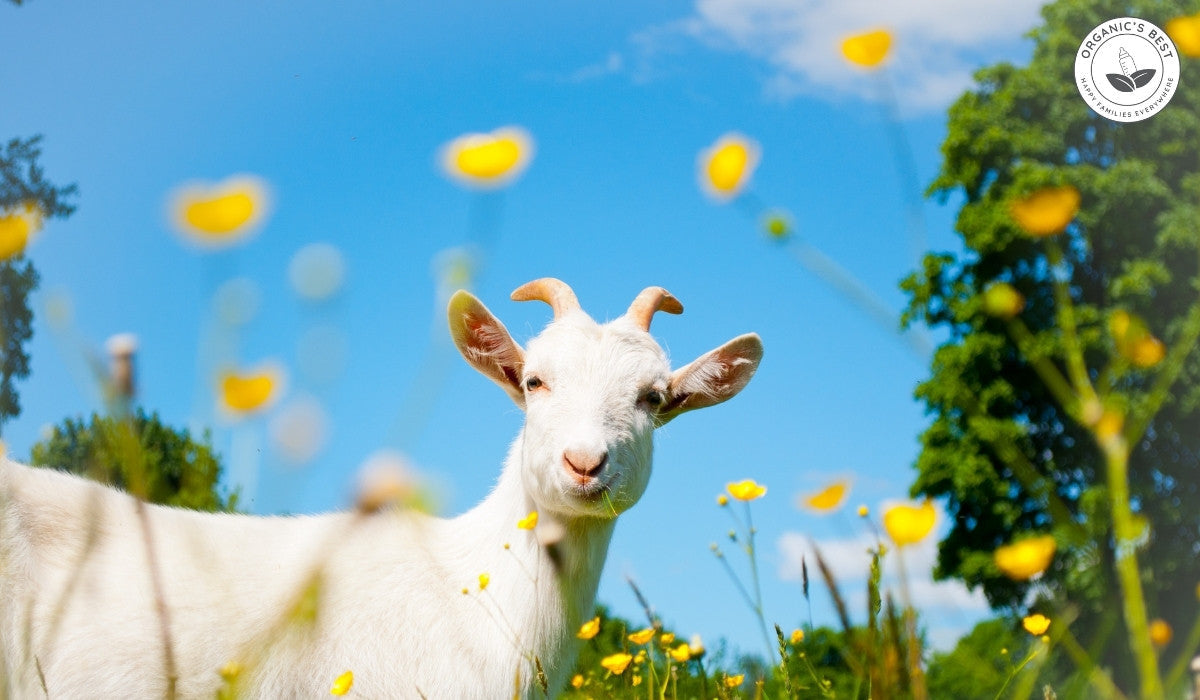Click to Get 2 FREE Boxes/Cans
Only New Customers! Click HERE to Get 2 Extra Boxes/Cans for Free With Your First Order.
BABY FORMULA
Offering new parents top-quality European infant formula from renowned brands like HiPP, Holle, Kendamil, and more. If you’re uncertain about which product to choose, our Formula Finder can help you make the best decision for your baby.
Baby Food
Offering new parents a premium selection of European baby foods, including jars, pouches, cereals, and snacks from esteemed brands like HiPP and Holle.
Best Goat Milk Formula for Babies: European & Organic
by Agustina Fernandez October 15, 2024 12 min read

Goats aren't just adorable-their milk has long been a source of vital nourishment for babies, especially those who struggle to digest cow's milk. Although goat milk formula has seen a surge in popularity over the past decade, its history goes back thousands of years. In fact, as far back as 4000 years ago, women turned to goat's milk as a substitute when cow's milk or breast milk wasn't available.
Today, goat's milk formula is praised for its remarkable similarity to breast milk, making it a fantastic choice for parents looking for a formula that supports their baby's growth and development as effectively as traditional options.
Whether you're searching for a solution to your little one's tummy troubles or you're an expecting parent exploring feeding options, this article is here to familiarize you with goat's milk formula and all of its wonderful benefits.
Join us below to discover what sets goat's milk apart, how to easily transition your baby to it, and explore our top picks for organic goat milk infant formula.
Table of Contents
- Goat Milk for Babies: A Nutritious Alternative to Cow Milk
- What's The Importance of Choosing a European Organic Goat Milk Formula?
- How to Transition to a Goat Milk Baby Formula
- Our Top Organic Goat Milk Formula Picks
- Kendamil Goat Formula
- Holle Goat Milk Formula: Dutch and German
- HiPP Goat Milk Formula
- Jovie Goat Milk Formula
- Nannycare Goat Milk Formula
- Löwenzahn Goat Milk Formula
- How to Decide Which European Goat Milk Formula is Best for Your Little One?
- FAQs on Goats Milk Formula
- Wrapping Up: Best Organic Goat Milk Formula
Goat Milk for Babies: A Nutritious Alternative to Cow Milk
We would like to start by making it clear that feeding needs can differ drastically between infants. What works perfectly for one baby may wreak havoc on the digestive system of another. Through trial and error, you will figure out exactly which feeding methods help your baby thrive.

Before we dive into the specifics of what qualities stand out in goat milk, it's important to remember that all baby formulas must meet the same rigorous nutritional standards.
This ensures that both goat and cow milk-based formulas provide essential micronutrients-like vitamins and minerals-as well as key macronutrients, such as fats and calories. To achieve this, the raw milk in any formula is carefully adjusted to meet strict infant nutrition guidelines.
While many parents opt for traditional cow's milk, which is perfectly suitable for most infants, some babies are happier and healthier on goat's milk formula, and here's why.

Goat's milk is compositionally similar to breast milk:
One of the key reasons goat milk formula is often preferred is due to the presence of A2 proteins, which are structurally more similar to the proteins in human breast milk. Unlike cow's milk, which contains both A1 and A2 proteins, goat milk has mostly A2 proteins.
A1 proteins in cow milk can be harder for some babies to digest because they form firmer curds in the stomach. This can make the digestive process more uncomfortable, resulting in excess gas or bloating. Alternatively, the A2 proteins in infant goat milk formula form softer, looser curds, reducing the likelihood of colic and other digestive issues.
Goat's milk is rich in essential nutrients:
Goats milk baby formula provides a rich array of essential nutrients crucial for your baby's healthy development. Some of the standout nutrients include:
-
Vitamin A: Goat milk-based baby formula is naturally rich in this fat-soluble vitamin, which is essential for maintaining healthy vision and immune function while promoting healthy skin and cell growth.
-
Vitamin C: This vitamin is known for its role as an antioxidant and strongly supports immune function. Vitamin C also aids in iron absorption, another critical nutrient for babies.
-
Calcium and Phosphorus: These minerals are essential for developing strong bones and teeth. Goat milk for infants naturally contains a higher concentration of calcium and phosphorus than cow's milk, which can help support better skeletal health.
-
Magnesium: This mineral helps regulate nerve and muscle function, aiding in the healthy development of your baby's neurological system. Magnesium in baby goat milk formula also plays a role in supporting cardiovascular health and energy production.
Smaller Fat Molecules for Easier Digestion:
Goat milk has smaller fat globules compared to cow milk. Thus, one of the benefits of goat milk formula is that it's more easily digestible. This feature is particularly important for newborn babies since their digestive systems are still maturing. Smaller fat molecules mean that the fats in goat milk can be broken down and absorbed more quickly.
Anecdotal evidence shows that infants fed goat milk formula experience fewer symptoms of indigestion, such as bloating and slow digestion, than those fed cow's milk formula. This ease of digestion is also attributed to goat milk's higher levels of medium-chain fatty acids, which require less energy for your baby's body to metabolize.
Lower Lactose Content
Lactose, the main carbohydrate in breast milk, provides babies with the energy they need for growth and development. Goat milk-based formula, depending on its composition, can contain less lactose than cow's milk formula due to goat milk's naturally lower lactose levels.
While goat milk isn't lactose-free, it typically has about 9% less lactose than cow milk. For babies with mild lactose sensitivities, this reduced lactose content may help ease issues like gas, diarrhea, or fussiness.
However, goat milk is unsuitable for babies with diagnosed lactose intolerance, as it still contains moderate amounts of lactose. But for those with mild sensitivities, the lower lactose in goat's milk formula may offer a gentler feeding experience. If you suspect CMPA or lactose intolerance, seek medical advice rather than self-selecting goat’s milk formula.
What's The Importance of Choosing a European Organic Goat Milk Formula?
Going organic can be an excellent choice for your baby's health, and in this regard, European formulas have you covered. The best European goat milk formula brands are held to some of the strictest regulations in the world, ensuring high standards for quality and safety that give parents peace of mind.
But what does it really mean when a European goat's milk formula is given the organic title?
To be certified organic in the European Union (EU), a formula must comply with stringent rules governing the entire production process, from the treatment of the animals to the ingredients used in the formula.
Here are some of the key EU Organic regulations that make these products so appealing to health-conscious parents:

Organic Ingredient Requirement: At least 95% of the product's agricultural ingredients must come from certified organic farming practices to carry the EU Organic logo.
Lactose Levels: A minimum of 30% of the carbohydrates in European baby formulas must come from lactose, aligning with breast milk's natural carbohydrate profile and ensuring proper energy for growth.
No GMOs: Using genetically modified organisms (GMOs) is strictly banned. This is significant as concerns remain over potential long-term risks like allergenicity, toxicity, nutritional alterations, and antibiotic resistance.
No Added Sugars: European organic formulas do not contain added sugars or artificial sweeteners. Many formulas in other parts of the world include corn syrup, but European options offer a cleaner alternative, avoiding unnecessary sugars.
Staged Nutrition: European formulas are tailored to specific stages of a baby's development, offering age-appropriate nutrition. In contrast, many other formulas are designed as "one size fits all" without accounting for different growth stages.
Prebiotics & Probiotics: Some European formulas include prebiotics and probiotics to support gut health, an option less frequently found in formulas from other parts of the world.
Mandatory DHA: European regulations require the inclusion of DHA (docosahexaenoic acid), a key omega-3 fatty acid that supports visual and cognitive development in babies.
Environmental sustainability: European organic farming practices emphasize animal welfare, biodiversity, and the reduction of harmful chemicals, making it a more eco-friendly choice for families.
How to Transition to a Goat Milk Baby Formula
If your baby is used to cow's milk formula or breast milk, you should be extra careful when switching to goat's milk formula to avoid discomfort while your baby's tiny tummy adjusts to their new formula.
While it is not uncommon for little ones to experience short-term changes to their bowel movements and mild digestive discomfort throughout this process, they are less likely to experience these hiccups if the transition is done gradually and with attention to your baby's individual needs.

Here's a step-by-step guide to help make the transition as seamless as possible:
-
Take Baby Steps: Begin by introducing a small amount of goat's milk formula into your baby's diet. Mixing it with your baby's current formula or breast milk can make the change less noticeable, both in terms of the new taste and how your baby's digestive system reacts to it. Mixing goat formula with expressed breast milk in a single bottle is also a valid approach, as it can help babies adjust to the taste more gradually.
-
Gradually Increase Goat Formula: Over the course of several days, slowly increase the proportion of goat milk infant formula while reducing the amount of the previous formula or breast milk. This gradual introduction allows your baby's digestive system time to adjust. The common recommendation for mixing milk looks like this:
-
¾ : ¼ for the first 4 days
-
½ : ½ for the next 4 days
-
¼ : ¾ for the next 4-5 days or even one week
-
Finally, 100% new formula
-
-
Monitor Digestive Health: Keep a close eye on your baby's digestive health during the transition. Watch for any signs of discomfort, such as gas, bloating, or changes in bowel movements. Keeping a journal of symptoms (gas, stool changes, fussiness) during the transition can help you and your pediatrician determine if goat’s milk formula is beneficial. If your baby seems uncomfortable, slow the transition down and give them more time to adjust or if your baby shows persistent distress, pause the transition.
Prior to beginning the transition to goat formula for babies, you'll also want to carefully consider which goat milk infant formula is best suited for your little one.
To do so, you can ask yourself questions like:
• Does my baby have any known intolerances or sensitivities?
• What stage of formula is suitable for their current age?
• Is there a formula brand that you are particularly fond of?
• Which formulas are easy to acquire and readily available?
The answers to these questions can help you choose the perfect goat's milk infant formula for your family. Below, you'll find some of our top picks for goat milk brands loved by parents all over the globe.

Remember, before making any major changes to your baby's diet, it's always wise to consult with a pediatrician or healthcare provider. They can provide personalized advice and guidance on how to transition to a new formula safely and effectively. Moreover, if your child has a cow's milk protein allergy (CMPA) or lactose intolerance, goat's milk has components that can trigger their symptoms, making it unsuitable for these conditions.
Our Top Organic Goat Milk Formula Picks
With various high-quality goat milk formulas available, knowing which one is the best fit for your baby can be challenging. Here's a breakdown of some of the top organic goat milk formulas available on the market:

Kendamil Goat Formula
Kendamil Goat infant formula, available in three stages, offers a creamy, earthy taste that babies love. Although Kendamil goat milk formula is not organic, it offers clean, European-quality ingredients. Made from premium whole goat's milk from UK Red Tractor farms, it includes natural ingredients like human milk oligosaccharides (HMOs) and milk fat globule membrane (MFGM) to support your baby's immunity and cognitive development, closely mimicking breast milk.
Kendamil avoids palm and fish oils, using eco-friendly fats from sunflower, coconut, and rapeseed oils for gentle digestion. The formula uses A2 goat milk with a 60:40 whey-to-casein ratio, similar to human milk. It's also certified vegetarian thanks to its plant-based DHA and avoidance of animal rennet.
Holle Goat Milk Formula: Dutch and German
Holle organic goat milk formula, available in Dutch and German versions, provides a gentle and digestible option for babies sensitive to cow's milk. The German version offers Stages PRE-4 in 400g boxes, while the Dutch version is available in Stages 1-3 in 800g cans.
Holle's prestigious Demeter certification sets it apart, ensuring adherence to the highest organic farming standards and eco-friendly production practices. Formulated with A2 goat's milk proteins, medium-chain fatty acids, and smaller milk fat globules, this formula closely mimics the composition of breast milk, making it an excellent choice for babies with delicate tummies.
Holle goat formula is free from palm oil and fish oil; instead, it sources its DHA from algae, providing an eco-friendly and milder-tasting alternative that supports healthy vision and cognitive development. Additionally, for babies aged 6 months and older, Holle's Stage 2 formula introduces complementary carbohydrates, including starch and maltodextrin, to meet their growing energy needs.
HiPP Goat Milk Formula
HiPP goat formula for infants comes in Stage PRE (0-6 months) and Stage 2 (6-12 months). Its minimalist approach-using lactose-only carbs and avoiding starch and maltodextrin makes it a gentle choice for babies, offering all the nourishment they need without the extra additives.
It also contains natural A2 goat milk proteins, which are known to avoid releasing inflammatory peptides during digestion. Thus, HiPP is an ideal choice for babies prone to tummy troubles.
Furthermore, it contains prebiotics, which are crucial in maintaining healthy gut bacteria, reducing colic, and improving stool consistency.
HiPP's blend of omega-3 and omega-6 fatty acids (DHA and ARA) supports your baby's neurological development and eye health, ensuring they get the right nutrients during early growth.
Stage 2 contains 50% more iron compared to Stage PRE, ensuring your baby is getting what they need for healthy blood formation and brain development.
Jovie Goat Milk Formula
Jovie goat milk formula comes in three stages, each celebrated for its natural, minimally processed recipe that promotes easy digestion and happy tummies. Jovies ingredients are sourced from European organic farms and are certified Glyphosate Residue-Free, ensuring it's free of one of the most common and harmful herbicides.
Jovie's goat milk formula for babies features gentle A2 proteins, short-and medium-chain fatty acids, and prebiotic-rich HMOs, which make it soft on sensitive stomachs.
In addition to goat milk's naturally bioavailable micronutrients like phosphorus and calcium, Jovie fortifies its formula with chelated iron and zinc, plus 5-MTHF, a superior folate source. Your baby's body more efficiently absorbs these nutrients, enhancing overall nutrition.
Nannycare Goat Milk Formula
Available in three stages tailored for each developmental phase, Nannycare prioritizes the natural integrity of its goat milk through gentle processing techniques. While not organic, Nannycare is made with clean, natural ingredients.
Packed with naturally diverse oligosaccharides-10 times more than cow's milk- Nannycare formula promotes gut health and supports the immune system. Each batch is carefully monitored for aroma and flavor, ensuring a consistently mild and creamy taste.
What sets Nannycare apart is its unique protein profile. It is free from added whey powder, allowing for gentler processing that avoids harsh heat cycles. This means its formula contains three times less lactoglobulin, a known allergen that doesn't naturally exist in human milk.
Löwenzahn Goat Milk Formula
Löwenzahn Organics is an innovative formula brand created by moms who collaborated with nutritionists to develop a premium-quality formula, drawing on their personal breastfeeding challenges.
This formula is crafted with organic whole goat milk powder as the primary ingredient, sourced from pesticide-free organic farms in Austria. This natural milk fat is rich in palmitic acid, similar to breast milk, and eliminates the need for palm oil, enhancing the absorption of essential vitamins A, D, E, and K.
Löwenzahn takes great care in balancing critical nutrients, using plant-based DHA from algae and ARA in an optimal ratio. Löwenzahn's formula also includes human milk oligosaccharides (HMOs), the fourth most abundant component in breast milk, after water, fat, and lactose.
How to Decide Which European Goat Milk Formula is Best for Your Little One?
Choosing the right formula for your baby is a highly personal decision; no one formula is universally perfect.
When deciding between these high-quality European goat milk formulas, consider your baby's unique needs and preferences.
Ask yourself WHY you are switching to a goat's milk formula. Are you switching because...
-
Your baby has a sensitive stomach: While all of the aforementioned formulas are great for sensitive tummies, HiPP, Jovie, Nannycare, Löwenzahn, and Kendamil Goat milk stand out for their lactose-only base.
-
You want an environmentally friendly product: Jovie is sustainably produced and closely aligned with nature, avoiding harmful herbicides. While Kendamil goat milk infant formula stands out for sourcing from UK Red Tractor farms, and Holle is praised for its Demeter certification.
-
You are seeking a formula closer to human milk: Kendamil and Löwenzahn are similar to breast milk thanks to the inclusion of human milk oligosaccharides (HMOs).
-
You prioritize minimal ingredients and processing: Nannycare is intentionally minimally processed, avoiding harsh heat cycles, while Holle prides itself on only including a small list of carefully chosen ingredients in its products.
FAQs on Goats Milk Formula
Here are the answers to some of your most commonly asked questions.
Is Goat Milk Closest to Breast Milk?
While no formula can exactly replicate breast milk, due to breast milk’s immunological components, goat milk formula is often considered a closer match than cow milk formula.
Is Goat Milk Formula Good for Babies?
Yes, goat milk formulas are highly nutritious and can be a great option for babies, especially those with sensitive stomachs or difficulty digesting cow milk.
Is Goat Milk Formula Suitable for Babies with Sensitive Tummies?
Absolutely! Many babies thrive on goat's milk formula because it is gentler on the digestive system. This is largely due to factors like the presence of A2 proteins, smaller fat molecules, and a lower lactose content, all of which make digestion easier for sensitive tummies.
Wrapping Up: Best Organic Goat Milk Formula
No matter the product, rest assured that your child is in good hands with whichever European goat's milk formula you choose. If you switch to goat's milk, just remember that slow and steady wins the race, so prioritize a gradual transition. Finally, remember always to consult your pediatrician for personalized advice!
|
Disclaimer:
Please be aware that this information is based on general trends in babies, and it is not medical advice. Your doctor should be your first source of information and advice when considering any changes to your child’s formula and when choosing your child’s formula. Always consult your pediatrician before making any decisions about your child’s diet or if you notice any changes in your child. Breastfeeding is the best nutrition for your baby because breast milk provides your child with all the essential nutrients they need for growth and development. Please consult your pediatrician if your child requires supplemental feeding. |
Agustina Fernandez
Dr. Agustina Fernandez earned her medical degree from the prestigious Universidad Nacional de Córdoba, Argentina. With a deep-rooted passion for pediatrics, Dr. Fernandez is currently on the path to specializing in children's healthcare. Recently, she has delved into the vital field of infant nutrition. Her research interests include breastfeeding, infant formula, and baby food in little ones’ formative years. Dr. Fernandez's commitment to this area of study underscores her dedication to ensuring the health and well-being of children from their earliest days.
Leave a comment
Comments will be approved before showing up.
Also in Organic Infant Nutrition and Health Blog

10 Winter Activities for Kids and Toddlers
by Agustina Fernandez January 06, 2026 8 min read
Read More
How to Choose The Best Infant Formula: A Guide to EU Organic Formulas
by Agustina Fernandez January 05, 2026 14 min read
Read More
Best Formula for Breastfed Babies 2026 Guide
by Agustina Fernandez January 05, 2026 15 min read
Read More
Reviewed by Dr. Bardha Citaku, MD
-

Dr. Bardha Citaku: Medical Reviewer of Organic's Best Blog
Dr. Bardha Citaku completed her medical studies at the University of Prishtina in Kosovo, where she began her journey into the field of medicine. She has since developed a career in medical research, contributing to projects with notable organizations, including the World Health Organization (WHO).
